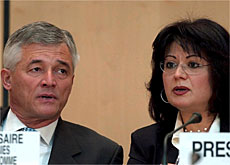Agencies appeal for massive aid

Two leading Geneva-based aid organisations have issued a SFr219 million ($158 million) appeal to avert a humanitarian crisis in Iraq.
The funds are to be used to assist hundreds of thousands of Iraqis likely to be affected by the war.
The International Committee of the Red Cross says it needs SFr108 million to cover the cost of its emergency operations in the region over the next four months.
While the International Federation of Red Cross and Red Crescent Societies has appealed for SFr111 million to help those forced to flee the conflict.
“Millions of Iraqis are living precariously as a result of twelve years of sanctions, especially the children, too young and too frail to resist more deprivation,” said Juan Manuel Suárez del Toro, president of the Federation, in a statement.
“We call upon the international community to help us bring vital help to those who need it most,” he said.
The Federation says it will use the funds to provide food, water and health care services to vulnerable families in Iraq and to refugees in Iran, Jordan, Syria and Turkey.
Human rights
With the United States-led military offensive underway, Swiss President Pascal Couchepin called on both sides in the conflict to respect international human rights laws.
Couchepin said that Switzerland was particularly concerned about the fate of Iraqi civilians and added that aid programmes in the region should continue.
Swiss Foreign Minister Micheline Calmy-Rey called on the United Nations to put its recent political wranglings behind and concentrate on providing humanitarian aid.
She urged the UN to prepare for the reconstruction of Iraq and said Switzerland was ready to participate in the process.
Last month, Switzerland hosted a humanitarian conference on Iraq in Geneva initiated by the Swiss foreign minister.
Geneva Conventions
The International Committee of the Red Cross urged the opposing sides to abide by the Geneva Conventions governing the conduct of warfare.
Speaking shortly after Washington launched military strikes against targets in Baghdad, the ICRC’s president told a news conference in Geneva that, even in wars, people had rights that must be respected.
“The impact of war is always dramatic, particularly on civilians,” Jakob Kellenberger said. “The priority now must be to protect the lives and the dignity of victims of this war.”
“The ICRC has reminded the governments of Iraq, the United Kingdom and the United States of their obligations under the Geneva Conventions, which they have all signed.”
Kellenberger recalled that it was prohibited under the Conventions to direct attacks against civilians, and he urged the warring parties to take every precaution to spare the civilian lives.
“There are limits to warfare,” Kellenberger said. “Indiscriminate attacks are prohibited, as are threats or acts of violence, the primary purpose of which is to spread terror among the civilian population.
No biological or chemical weapons
He reminded countries involved in the conflict that use of biological and chemical weapons was outlawed.
Kellenberger revealed he had learned of the start of the US military campaign from his delegates in Iraq. The ICRC has ten delegates in the country and more than 100 local staff, as well as dozens of other delegates in Kuwait, Iran and Jordan.
Kellenberger said preparations had been made for the outbreak of war and ICRC delegates intended to stay in place in Iraq for the duration of the fighting, carrying out humanitarian operations.
“It is essential that we carry out our humanitarian tasks,” he said. Kellenberger also issued an appeal to the warring parties to protect his staff in Iraq and allow them to carry out their work.
“Red Cross and Red Crescent emblems, and those working under them, must be protected.”
ICRC says the movement of internally displaced people and refugees has started, mostly in the direction of Iran and Jordan.
Aid workers say they are prepared to deal with 7,000 war wounded and have additional medical material to cope with 180,000 wounded civilians.
The ICRC says it can guarantee water supplies for three million people.
The Federation is warning that more than 305,000 people may be forced to flee Iraq.
Refugee camps have been set up Iran, Jordan, Syria and Turkey.
Around 30 emergency response units have been set up to provide health care and clean water.

In compliance with the JTI standards
More: SWI swissinfo.ch certified by the Journalism Trust Initiative














You can find an overview of ongoing debates with our journalists here . Please join us!
If you want to start a conversation about a topic raised in this article or want to report factual errors, email us at english@swissinfo.ch.